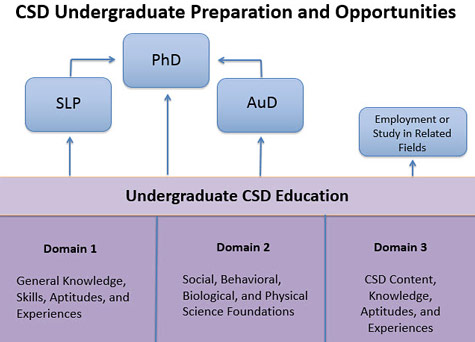There are many pieces to becoming an Audiologist. Use the navigation below to explore each aspect of preparing to become an Audiologist.
- What is an Audiologist?
Hearing and balance disorders can be assessed, treated, and rehabilitated by an audiologist. Audiologists are healthcare professionals who provide patient-centered care in the prevention, identification, diagnosis, and evidence-based treatment of hearing, balance, and other auditory disorders for people of all ages. Hearing and balance disorders are complex with medical, psychological, physical, social, educational, and employment implications. Treatment services require audiologists to have knowledge of existing and emerging technologies, as well as interpersonal skills to counsel and guide patients and their family members through the rehabilitative process. Audiologists provide professional and personalized services to minimize the negative impact of these disorders, leading to improved outcomes and quality of life.
Audiologists are licensed and/or regulated in all 50 states and the District of Columbia.
Responsibilities include:
- Screening newborns for hearing loss in the hospital using a special microphone that measures sound coming out of the ear
- Exploring the potential use of cochlear implants for children and adults who are not benefiting from hearing aids
- Activating and programming cochlear implants after surgery
- Helping students with hearing loss participate in classroom activities using amplification technology to listen to the teacher and to other students
- Reteaching adults with hearing loss to listen using a hearing aid, and educate family members about the benefits and limits of communication using a hearing aid
- Working in factory, construction, or military settings to measure noise levels and educate workers on how to protect their hearing from damaging volumes of noise
- Evaluating balance disorders in patients with complaints of dizziness, and collaborate with physical therapists, occupational therapists, and physicians to treat the disorders
- Helping people who are deaf or hard of hearing advocate for their communication needs in classroom and vocational settings
Average salary range: $65,000-87,000
More information here: https://www.asha.org/aud/- Becoming an Audiologist
- Obtain a Bachelor's degree: Must complete a four-year college degree and take
 necessary prerequisites (4+ years). An undergraduate degree in CSD is the most common pathway into audiology and speech-language pathology graduate programs but is not required. Individuals with undergraduate degrees in other majors may be required to complete prerequisite coursework. Visit EdFind for more information.
necessary prerequisites (4+ years). An undergraduate degree in CSD is the most common pathway into audiology and speech-language pathology graduate programs but is not required. Individuals with undergraduate degrees in other majors may be required to complete prerequisite coursework. Visit EdFind for more information.
Apply to a Graduate program: The doctoral degree in audiology (e.g., AuD) prepares the student for entry into independent practice as an audiologist. The curriculum provides academic and clinical preparation for patient-centered care in the prevention, identification, diagnosis, and evidence-based treatment of hearing, balance, and other auditory disorders for people of all ages. Search EdFind to find an audiology graduate program. (3-4 years)
Will administer at least 600 different anesthetics during surgery
Pass a Certification Exam: In order to be eligible to apply for ASHA certification in audiology (i.e., Certificate of Clinical Competence in Audiology [CCC-A]), the student must graduate from a program that is accredited by the Council of Academic Programs in Audiology and Speech-Language Pathology (CAA). - Audiology Prerequisites
- General Knowledge, Skills, Aptitudes, and Experiences
- Critical thinking, problem solving, logical reasoning skills
- Exposure to the scientific method and opportunities for research experiences
- Exposure to the culture of science (e.g., ethics, interdisciplinary research, team science)
- Exposure to other disciplines and professional/scientific organizations
- Opportunities for interdisciplinary and interprofessional collaborative learning
- Exposure to "evidence-informed decision making" as a lifelong learning journey
- Cultural competence
- Competencies in oral and written communication (e.g., reading, writing, listening, speaking)
Social, Behavioral, Biological, and Physical Science Foundations
- Biology
- Human anatomy and physiology
- Linguistics
- Math and statistics
- Neuroscience
- Physics and acoustics
- Psychology and cognitive science
- Exposure to research contributions across fields
CSD Content Knowledge, Skills, Aptitudes, and Experiences
- Historical and philosophical tenets of the professions
- Normal communication (speech, language, hearing, cognition) across the lifespan
- Overview of hearing and balance disorders
- Overview of speech, language, and swallowing disorders
- Overview of the clinical process, continuum of service delivery, and evidence-based practices
- Co-curricular experiences, such as grand rounds and colloquia, service learning, and undergraduate research
- Exposure to health and education policy and advocacy
- Knowledge of how to work in teams
- Knowledge of clinical, academic, and research careers, including faculty and graduate student research
* Check you major requirements before choosing classes.
Note: The above courses are only suggested, not absolute.
More information can be found here: https://apps.asha.org/eweb/ashadynamicpage.aspx?site=ashacms&webcode=caalisting&caacat=aud - Experiences
- Choose experiences that are meaningful to you and think outside the box!
Here are some good places to start looking for experiences at UC Davis:
Health Related Experiences through the Career Center (CC)
Opportunities to publish and present research through the Undergraduate Research Center
Global Health Internships through Study Abroad
Health Internships through the Washington Program
Volunteering for the UC Davis Pre-Health Conference
Completing community service
Join a Pre-Health related club or other student organizations through the (CSI) Center for Student Involvement
Volunteer at a Student Run Clinic - Applying to Doctoral Audiology Programs
- Apply to audiology programs by using this search tool: https://apps.asha.org/eweb/ashadynamicpage.aspx?site=ashacms&webcode=caalisting&caacat=aud
